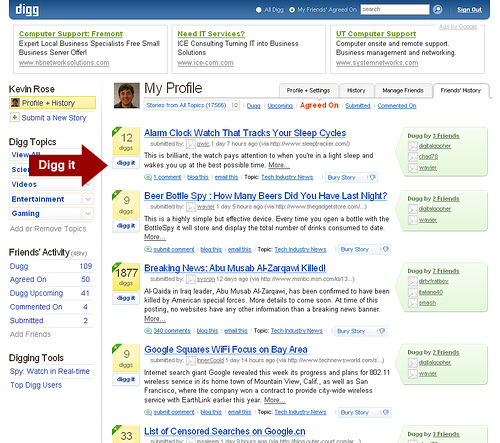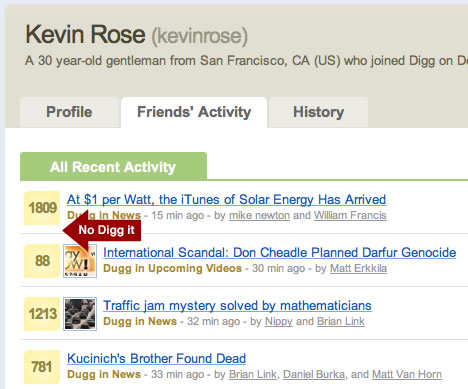Digg’s Design Dilemma Redux
Digg continues to improve their interface to counteract gaming. How they have evolved the site over the last year provides good design insight for anybody working on social web apps.

Back in Sep 2006, the social news site Digg was coming under massive scrutiny because of claims of gaming the system by a group of 30 or so Top Diggers. In my post Digg’s Design Dilemma I argued that the members of Digg were not to blame…the design of the site was.
Now when I say “blame” I don’t mean they deserved punishment. I mean that the design was enabling the behavior, in some cases it was even promoting it. The diggers were simply doing what their environment allowed them to do.
Since then, Digg has made some subtle interface tweaks that help to curtail gaming activity. These changes were made over time. (I’m only just now writing them up) They highlight some of the challenges of having a growing user base with active participants.
Digg continues to improve their interface to counteract gaming. How they have evolved the site over the last year provides good design insight for anybody working on social web apps.

Back in Sep 2006, the social news site Digg was coming under massive scrutiny because of claims of gaming the system by a group of 30 or so Top Diggers. In my post Digg’s Design Dilemma I argued that the members of Digg were not to blame…the design of the site was.
Now when I say “blame” I don’t mean they deserved punishment. I mean that the design was enabling the behavior, in some cases it was even promoting it. The diggers were simply doing what their environment allowed them to do.
Since then, Digg has made some subtle interface tweaks that help to curtail gaming activity. These changes were made over time. (I’m only just now writing them up) They highlight some of the challenges of having a growing user base with active participants.
Removal of the Top Diggers List
The Top Diggers list showed who was able to get the most stories on the front page of Digg.
The first big change was when they finally dropped the Top Diggers list (Feb 2, 2006). Kevin Rose explains why:
“Which leads me (Kevin Rose) to a disappointing trend that we’ve noticed over the past several months. Some of our top users – the people that have spent hundreds if not thousands of hours finding and digging the best stuff – are being blamed by some outlets as leading efforts to manipulate Digg. These users have been listed on the “Top Diggers†area of the site that was created in the early days of Digg when there was a strong focus on encouraging people to submit content. The list served a great purpose of recognizing those who were working hard to make Digg a great site, as well as a way for new users to discover new content. Now, as the site has matured and we regularly get 5,000+ content submissions per day, we believe there are better ways to discover new friends based on your interests and what you’re digging. So if you have been digging stories about digital cameras and Oolong tea, you will be introduced to other top users with those interests.
So what does this all mean? After considerable internal debate and discussion with many of those who make up the Top Digger list, we’ve decided to remove the list beginning tomorrow.”
Dropping the Top Diggers list no doubt reduced the incentive for gaming on the site, as members lost any public recognition they formerly enjoyed. Never fear, though. Chris Finke, a developer, created a new Top Diggers page with the same functionality.
Finke wrote about the Top Diggers list removal:
“It’s an exercise in futility. A competent programmer could easily throw together a page scraper to determine the top submitters, so when the dust settles, Digg will still have problems with pay-for-play, but the most prolific users will no longer be recognized by Digg for their work that makes the site so successful.”
Finke’s right in that preventing a Top Digger’s list is an exercise in futility. But that’s not the real issue, as he suggests. The real issue is how much attention is being paid to the list. If the list is on Digg.com, then a tremendous amount of attention is paid to it and diggers enjoy the publicity (and rewards) from it. If the list is on another domain it’s just not that important. Perhaps a small number of people pay attention to it, and perhaps it could become important, but the community as a whole doesn’t seem to be paying attention to it.
This brings up a larger point…you can never completely prevent gaming. On that note, Clay Shirky used to say that social software is stuff that gets spammed.
What you can do, and what Digg is doing, is make clear what behavior you want and simply try to enforce that behavior with social norms and algorithmic detection. By taking down the Top Diggers list, Digg is effectively saying “we don’t support that behavior”.
Changes to Friends Page
The second big change is how Digg has evolved the Friends screen within the profile pages of the site (big release on Sep 19, 2007). Back when Digg was hearing lots of criticism, the friends page allowed immediate digging of friends’ stories. Here’s a screenshot (I apologize for the fuzziness)

Image copied from this RWW writeup on the Digg 3.0 redesign
The new design has taken this ability away. You can no longer digg your friends’ posts without going to each one in turn.

This is another design choice that lessens the ability to game the system. By simply changing the ease-of-access to information, Digg makes gaming not less possible, but less easy.
I’m not sure if it’s written in stone anywhere, but the old maxim rings true: The easier it is to do, the more it will be done. So when digging was super easy, it was done a lot, especially by people trying to game the system. Now that it takes more effort, gaming will be decreased.
But let’s step back a bit and ask: What’s going on here at a higher level? Well, I think we’re seeing evidence of a new sort of problem that seems unique to social design.
Small interface changes have huge system effects.
The small change of taking away the ability to digg on your friends page undoubtedly has a big effect on the ability to game the system. My guess is that it would take about an order of magnitude longer given the sheer simplicity of the Digg ajax widget.
An aside: as I was thinking about this bigger picture I stumbled onto this slide deck from Gene Smith, who seemed to be talking about Digg in terms of positive and negative feedback. In other words, each action on the site is either amplifying the effect (positive feedback) or dampening it (negative feedback).
It turns out that this is a great way to explain what’s going on in Digg. Gene’s definitely on to something here. (and, I might add, a great way to explain most ratings and review systems…the difference with Digg is that time is much more important…in most ratings systems time doesn’t dampen the rating like in digg!)
So, after reading up a bit on positive and negative feedback, equilibrium, amplification, and dampening…
What happened was that the old friends interface was designed in such a way as to amplify the # of diggs. Only, it amplified them too fast. If people were so inclined, they can put the system out of equilibrium by digging all their friends stuff. Now what does getting out of equilibrium mean in this case?
That other people got upset. Yes, that’s the technical way of describing out of equilibrium on a social site.
What’s happening in the new design is that Digg is dampening the friend effect. They’re watching the system, hearing that there is a problem (note there are several kinds of feedback), and saying…how can we dampen that effect in the design? To do that required only the smallest of changes, but nonetheless the outcome is potentially huge. I don’t know if Digg sees this as a win, but they’ve had to have seen some improvement.
(btw: Digg’s Daniel Burka on interpreting user feedback)
Note that this dampening would also result in a fewer number of diggs. I’m assuming, however, that the fewer diggs is trivial compared to their immense traffic. Digg has millions of users, and only a very small proportion of them were/are gaming.
This is the basic model of social software. Get input (signal) from individual users, create aggregate displays for everyone to see, and let users provide feedback. Over time, watch the health of the system and provide amplification or dampening when necessary to keep it stable (in equilibrium).
On Digg, when feedback is positive (people digging stories) the signal is amplified. When that feedback is negative (people burying stories), the signal is dampened. Time is a dampener, too. Digg has built into the system a dampener which removes stories after a certain period of time. If they didn’t, the stories with the largest number of diggs would stay on the home page forever.
In this case, Digg decided, after assessing the health of the system was out of whack, to dampen it by taking away the ability to provide positive feedback (diggs) on the friends page. There are still many ways to amplify the signal…
My guess is that as more social systems see this kind of activity, and the ease with which the system can be gamed with super fast input widgets like digg has, we will see a lot more dampening like this to happen.
It’s the only way to keep the system in equilibrium.